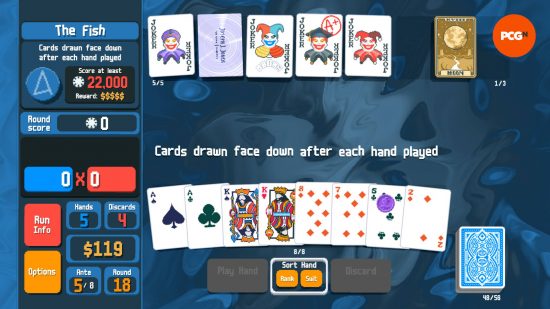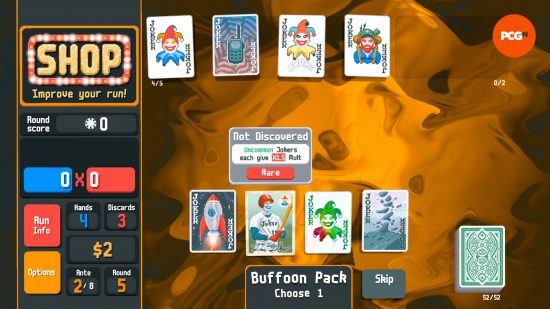I’m honestly surprised that I’ve taken a liking to Balatro as much as I have. It’s a new, affordable, and exceptionally well-reviewed roguelike that tasks you with playing poker hands to amass a set number of chips per stage. Further depth comes in the form of non-playing cards that alter your deck, multiplier, and more to see you through what initially feels like impossible odds. Balatro has become my new obsession, and if you give it a chance, it’ll likely become a big timesink for you too.
First, I should mention that you don’t need to be a card game ace to play Balatro. Each run requires you to beat eight Antes, with each consisting of a small Blind, a generally easy round, a Big Blind with a far higher chip requirement, and one of 28 boss Blinds, which throw a specific debuff or constraint at you. For example, one Blind discards two random cards from the remaining selection after playing a hand, while another debuffs a suit so those cards don’t score points. You must play the highest-value poker hands available to win a round, using limited discards to cycle through your deck. If you run out of hands, your run is over.
What makes Balatro a roguelike game is the shop you visit between rounds, where you can buy upgrades or take a chance on booster packs with a random assortment of cards. Here, you can purchase some of the 150 collectible Jokers, each unlocked by completing challenges, which you can use to add chips, multipliers, and so much more. They all have unhinged and frequently hilarious designs; my favorite is just a baseball card that someone’s drawn on to look like a clown. Some are deceptively useful, like the Shortcut Joker that allows you to skip numbers when playing a straight; incidentally, the key card behind my first victory.
Soon into your first run, you can also purchase Tarot cards, which have a one-off effect when used. There are also Planet cards that increase the multiplier and value of the specific poker hands, new playing cards to add to your deck, spectral cards that have game-changing effects, and vouchers that mostly give permanent upgrades, including the Balatro blank voucher, which may or may not be a waste of money. You can also acquire Tags by skipping Small or Big Blinds in an Ante, adding even more effects. These upgrades ultimately decide whether a run is heading for a hot streak or is only worth folding the first chance I get.
But I always have that voice lingering in my head when it’s all over: one more go? And that’s the beauty of Balatro. Your first run will likely end abruptly, either due to not meeting the Blind’s chip requirements or because the Boss Blind’s condition simply stops you in your tracks. But no matter how often I failed, I was always unlocking new Jokers and new potential paths to victory. Even after winning my first run, it still surprises me with more unlockables, including new decks and stakes to change the difficulty.
It helps that its retro art style, which gives me Hypnospace Outlaw vibes, is charming yet straightforward. My only real complaint is that the music gets old pretty quickly, but I’m otherwise in total agreement with the glowing reviews you may have spotted on Metacritic, where it’s currently the year’s best-reviewed indie game.
If you’re looking for a new roguelike on a budget, Balatro is an absolute steal at $15. It’s straight to the point, showing its hand quickly, enticing you with its simple-to-understand gameplay loop. Give it a few runs, unlock a few new Jokers, and pretty soon you’ll find it impossible not to shuffle up and play one more run.
While you’re here, why not check out our sister site Wargamer’s list of the best board games on the market.


